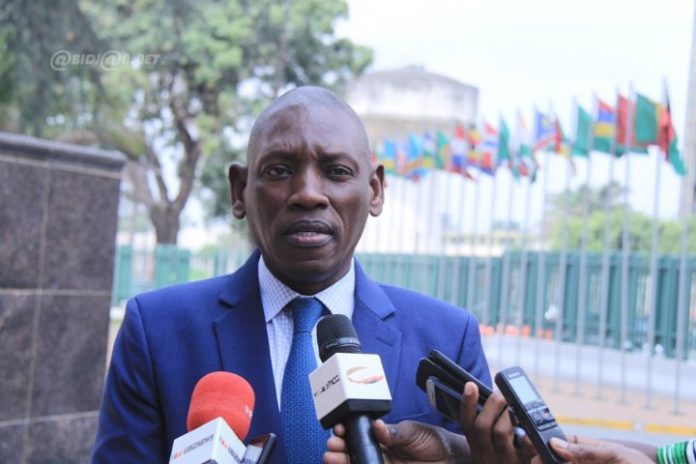UNFPA Director Mabingue Ngom presents the Demography, Peace, Security project. This initiative aims to better understand the characteristics of the Sahel countries in order to meet its specific needs.
How does the United Nations Population Fund (UNFPA) play its role from Dakar to spread throughout the region?
As you know, with the Covid-19 crisis, everything has changed. And the changes to come are set to be even more important. Since March, we are adapting. With teleworking, we have been able to invent new approaches that allow us to continue to support the countries of the region. These new methods have allowed us to learn, adapt and progress.
What is changing?
Obviously, nothing will be the same again. In the way of working and of supporting countries, in the way of solving problems. But also in the relations between actors within the international community – countries, partners, organizations of the United Nations system, the private sector, civil society, etc.
We have learned a lot. We have been able to adapt to new difficulties, invent and deploy new methods that allow us to do more and better with the limited resources at our disposal. And these methods will remain, even after the end of the health crisis.
I think that the symbiosis of traditional approaches and new approaches, of each other’s experiences, will open up original paths which can be extremely promising. I am tempted to say that the crisis has pushed us to be more creative and forced us to make better use of tools that were once much less exploited.
How widespread is the pandemic in the Sahel?
Afflicted by a combination of armed conflict, terrorism, extreme weather conditions and economic instability, the region was, long before the pandemic, at the center of all international political debates.
In the central Sahel zone, and in particular the Liptako Gourma region, which borders Burkina Faso, Mali and Niger, this security crisis resulted in the deaths of some 4,000 people in 2019 alone and caused d ‘significant displacement of populations in the three affected countries.
The crisis is combined with strong demographic growth. The population is growing at a rate that is much greater than other countries in the world. This translates into a large proportion of the young population (over 60% of the population is under 15) and a strong social demand that the public authorities and national budgets, as well as households, struggle to cope with.
More than 8 million children between the ages of six and fourteen are out of school, nearly 55% of children in this age group. While governments are forced to devote the bulk of resources to the military response, which would represent nearly a third of the national budget.
This is why, very early this year, UNFPA as well as all the United Nations System agencies operating in the West and Central Africa region paid special attention to the Sahel.
We have thus taken care to listen to the main actors in each, which has enabled us to assess the quality of the response and to follow a mechanism for daily monitoring of the evolution of the pandemic in these countries through meetings. regular (every Tuesday morning, from Dakar).
Despite the relatively low figures for infection cases, the Sahel remains one of the regions most affected by Covid-19, due to the socioeconomic fragility of the countries linked to the disorganization of the education and health systems.
Each additional challenge created by Covid-19 aggravates this existing situation. It is understood that in such a context the populations do not have the means to remain confined to their homes
How can we find a solution in these circumstances?
This is a very important question: by the end of 2019, we had conducted six empirical studies. I insist on this last word, that is to say based on data, figures, solid facts which constitute as much evidence, without ideological a priori.
It is a new project that we are in the process of initiating. Initially, these studies were based on three case studies in three different countries that make up the central Sahel made up of Burkina Faso, Mali and Niger.
We have conducted straightforward statistical studies to assess the evolution of a number of variables as the crisis emerges and develops …
Concretely, what is it?
We have looked, for example, at changes in health spending, education spending, military spending, and other components of demand.
We have realized that as this demand increases, the fiscal space is shrinking as these are mainly struggling countries that are forced to dramatically increase military spending.
The more countries increase this spending, the less fiscal space they have to meet current and future demand.
Thus, in recent years, security spending has increased sharply in the countries in question, to the detriment of health spending, while governments have all committed to allocate 15% of their budget to health.
In Niger, for example, they rose from 10.3% of expenditure financed with internal State resources in 2010 to 15.3% in 2017. At the same time, youth unemployment increased significantly from 13% % to 17%. And the mobilization of internal resources remains timid since 2015.
Due to the large number of young people in the general population, the government recorded a deficit of 1,880 billion CFA francs (2.87 billion euros). It is the consequence of the needs of dependent populations, the 0-27 age groups and those over 64.
Did the Government do anything to control the situation?
Despite the 10% bar crossed in 2017, the Burkinabè government still remains very far from the commitment to allocate 15% of its national budget to the health sector, while the share allocated to the security sector has seen a good increase. an increase of almost 14% in 2019.
An identical situation can be observed in Mali where from 2010 to 2018, the amounts allocated to security have tripled to the detriment of health expenditure. This increase in military spending has taken place in a context where state resources have not increased much, and sometimes not at all.
While in some developed countries such as Japan or in the North, we observe an opposite trend where military or security spending is contained around 4% to 5% of GDP.
We see that when social demand increases, due to population growth, the resources to meet that demand are limited. This contributes to increasing social tensions which can lead to security crises such as we see in the Sahel.
With each terrorist attack the governments concerned are forced to strengthen security measures by cutting funding for priority sectors such as education and health that are already under-served.
We are thus witnessing a drop in the coverage and quality of essential services. This spiral naturally has a negative impact on the relationships of trust that must exist between the national authorities and the populations.
What is the method that would lead to this new reading and the solutions that go with it?
The studies and modeling work that we have carried out with renowned institutions point to a relationship that may exist between demographic dependence and the occurrence of crisis in the countries of the Sahel.
This is an extremely interesting element. One of the important results of these studies obtained by classifying countries statistically shows that the group of Sahel countries is the one with a low level of security.
These countries have a higher demographic dependence (75% against 47% for the general average), a youth unemployment rate 10 points higher than the general average (27.71% against 17.86%) and a level of education at secondary level twice lower than the general average (36.94% against 72.18%).
By further researching this descriptive result with a statistical model, it appeared that an increase in the demographic dependency ratio of one percentage point leads to a deterioration of the peace and security index of 0.010 points for the country.
That is to say that alongside other factors, demography contributes directly and indirectly to the explanation of the occurrence of conflicts in the world in general and in the Sahel in particular.
As for the prospects for peace and security in the Sahel, we observe the modeling work carried out by PRIO (Peace Research Institute Oslo), which focuses on the risk of an armed conflict occurring by 2050.
They show a clear increase in the risk of the incidence of conflicts for some countries of the Sahel such as Nigeria, Niger, Mali and Burkina Faso, with a potential significant contagion effect for the immediate neighbors.
Simulations indicate that high population growth, poverty and low education are linked to an increased risk of conflict.
What to conclude?
The results of these studies should allow us to consider more objective and sustainable solutions based on new paradigms and new types of partnership. Of course, they will not solve all the problems of the Sahel, but at least one of the major problems which is at the origin of the evil and is the root of it.
Indeed, the solutions envisioned over the past fifty years have been aimed only at treating the symptoms, the most pressing and visible problems of everyday life. Unfortunately, we have not taken enough distance to explore these issues to better understand them and act on them in a sustainable manner to transform the lives of people in the Sahel.
If we invest the significant resources that go into military responses today, we will have better results. Of course, we cannot ignore these military imperatives, but we must be able to have an optimum basket of instruments in order to be able to change the pattern of demographic dependence in the Sahel.
How to ensure that political actors take ownership of the conclusions of your work and translate them into action?
Nigerien President Mahamadou Issoufou, who shows remarkable vision, is very committed to peace and security in the Sahel. In 2013, he launched a heartfelt cry for the international community to commit to capturing the demographic dividend.
He understood that if we did not tackle this issue of demographic dependence to capture this demographic dividend, it would be difficult to talk about economic development, especially when the crisis is stopping everything. See what is happening today in Mali, Burkina Faso or Niger.
This is the reason why it will host an international symposium in Niamey [scheduled for November 2020] bringing together all the actors working on demographic, peace and security issues. Economic, political and strategic studies institutes will be invited to provide a detached reading of these factors and the results of our statistical modeling work and to put public policy proposals on the table.
Which will guide the development programs and plans of the next African generation. All of Africa is concerned, because what is happening in the Sahel affects all of Africa.
President Mahamadou Issoufou is at the end of his mandate …
Yet he has enormous capacity for action! I am convinced that his action for the Sahel and for Africa will not end with his mandate. It will continue to engage in the search for solutions and their pragmatic, non-ideological implementation supported by facts. These are projects that have the capacity to change the lives of the populations of the Sahel and of all Africans.

